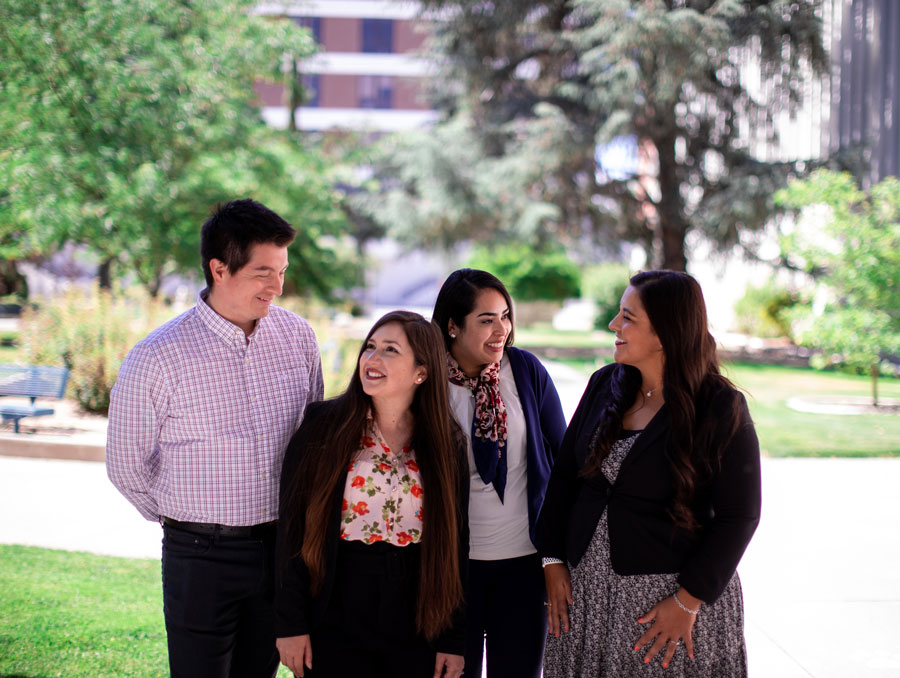Lea sobre el laboratorio de Lorraine Benuto, el Centro DICE, en español.
When interviewing potential graduate students, Associate Professor of Clinical Psychology Lorraine Benuto asks a question that often surprises them:
Would they be interested in learning how to provide services in Spanish?
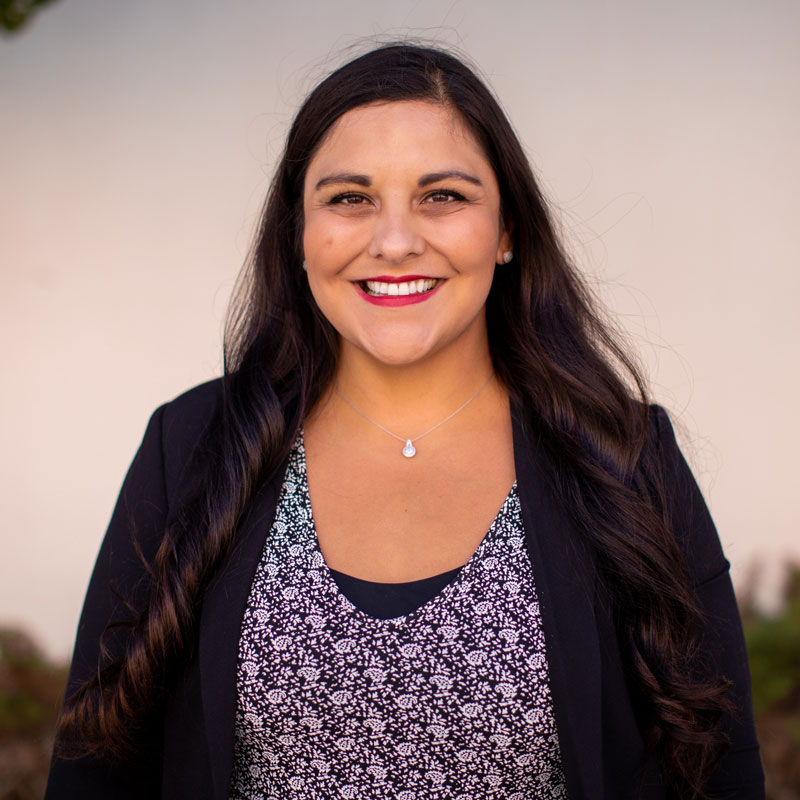
Lorraine Benuto
Despite the fact that most students interviewing for a spot in her lab are native-Spanish speakers hoping to work with the Latinx population as clinicians and researchers, the question often catches them off guard. Benuto’s offer is unique. In most programs across the country, the hard work of translating not only the language, but the treatment, research, concepts and behavioral interventions in a way that maintains the evidence-based mechanisms while allowing for idiosyncratic adaptations that appropriately address the unique needs of a Latinx individual is left to the student to figure out on their own. It’s complicated work. And it’s one reason there is a deficit of Spanish-speaking providers in Nevada and across the country. The answer to Benuto’s question has so far been a resounding yes.
As a young Latina college and graduate student, Benuto did much of this hard work on her own. Now, as a professor, she has dedicated her career to easing that burden for future students. Since joining the Department of Psychology’s faculty first as a postdoctoral fellow in 2009 and in 2016 as an assistant professor, her growing body of research on culturally-tailored, evidence-based psychotherapies for Latinx individuals has become some of the most cited in the field. In her first year as faculty, Benuto founded La Cliníca, a specialty clinic offering free mental health services to Latina women and children who have experienced domestic violence, assault, or sexual abuse. La Cliníca has helped to fill a void in Nevada by providing access to bilingual mental health services and economically accessible care while promoting mental health literacy within the Latinx community. More recently, Benuto developed and launched Psychology Research Opportunities for Underrepresented and Diverse students (PROUD), a program that provides professional development and research opportunities to help undergraduate students become competitive applicants for graduate school. In the past five years, she has worked with nearly two dozen graduate students, many of whom are Latinx, to train in culturally-sensitive psychological services.
"I want to provide students, especially underrepresented students, with an experience at the University that really enhances their sense of belonging and empowers them to feel that they are members of the scientific community—the sky is the limit."
“Diversification of the field of clinical psychology is something I have been missioned around as a professor for the last five years and prior to that as a mentor to undergraduate students,” Benuto said. “One of my hopes is that my students will graduate and go on to mentor minority students and contribute to the diversification of the field themselves by contributing to the pipeline of underrepresented students. My second hope is that my graduate students are well-prepared to work with the Latinx community either as clinicians or as researchers.”
Benuto’s definition of culturally-sensitive psychological services is reflective of how she engages with her clients in the clinical or research setting, as well as with her students. It’s about the individual. Having grown up in rural northern California in a predominantly white community, Benuto was one of few Latinx kids in her school. Her father’s work was seasonal, and during the off-season, her family would spend about three months in Mexico. This, combined with her mother’s cultural heritage as a member of the Maidu tribe, provided Benuto with personal experiences related to the nuance of identity and culture.
Benuto’s desire to better understand her experience—to study it—put her on the trajectory she is still on today. Along with her team of doctoral candidates and postdoctoral fellows, each with their own nuanced perspectives to contribute, the research and publications coming out of her lab are far-reaching. From documenting the stigma around mental health within Latinx communities to the development of a widely disseminated guidebook for treating non-English speaking clients, Benuto and her team are building a library of information to support clinicians working at the intersection of culture and psychology.
This fall, Benuto is mentoring seven graduate students and two postdocs, two of whom are returning to her lab after receiving their doctoral degrees to continue their research: Drs. Jena Casas and Cyndy Soto. Casas was the recipient of the Sam Lieberman Regents’ Award for Student Scholarship in the spring of 2021, one of a number of accolades Benuto’s students have received. It is clear Benuto’s priority lies with her students, particularly in supporting her students in overcoming many of the stigmas her lab is working to change.
“I want my students to feel empowered,” Benuto said. “We talk a lot in my lab about imposter syndrome. That’s a phenomenon across cultures in academia, but it seems to be exacerbated in students of color for lots of different reasons. I want my students to feel competent and confident. I want to provide students, especially underrepresented students, with an experience at the University that really enhances their sense of belonging and empowers them to feel that they are members of the scientific community—the sky is the limit.”
Following are the stories of four of Benuto’s students who prove just that.
Rosy Chavez-Najera
“I can identify with this population because I was there.”
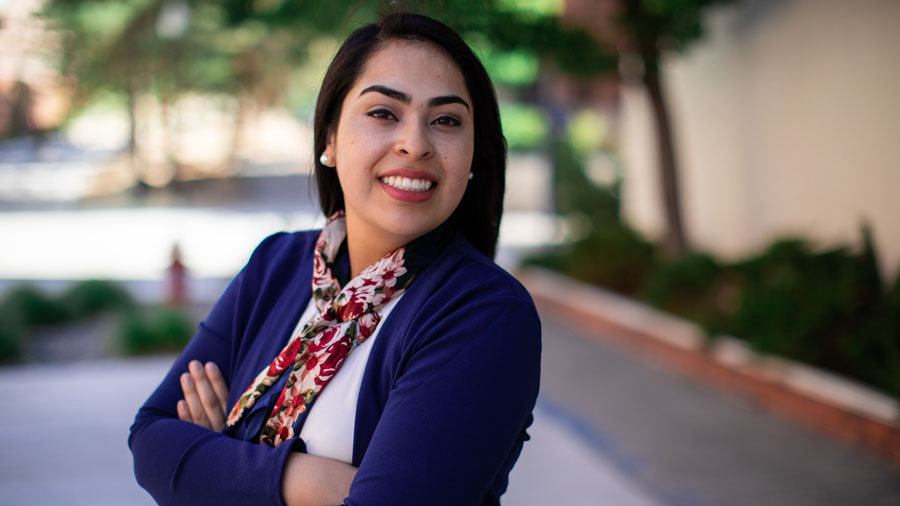
As a local of Reno, Nevada, doctoral student Rosy Chavez-Najera first began working in Benuto’s lab as an undergraduate. In the summer of 2021, she received her master’s degree in clinical psychology and she is expected to earn her Ph.D. in 2024. But her path to becoming a psychologist began long before she stepped foot on campus. At eight years old, Chavez-Najera’s father was suddenly deported back to his home country. Overnight, her mother became a single parent to two young girls.
“It was from one day to the next that he was gone,” Chavez-Najera said. “We were in this hopeless situation where we could do nothing. Our family was essentially broken. It was absolutely very traumatic, a nightmare, for all of us.”
Chavez-Najera watched as her mother slipped rapidly into a deep depression marked by severe anxiety and regular panic attacks. At the time, Chavez-Najera didn’t have the language to define what she was witnessing, but she knew she wanted to do something to help.
“I always had this sense of caring for her and doing everything I could to help her, but I didn’t know how,” Chavez-Najera said. “We had a television and an antenna that got us the free local broadcast channels, and I remember watching Dr. Phil. He would say these little phrases and I would see that people would get better when they were on the show. I decided I would copy whatever he said and say it to my mom so I could help her.”
Each day, Chavez-Najera would run home from the school bus to catch the 4:00 p.m. show. Sitting in front of her television with a notebook, she would take meticulous notes of specific phrases Dr. Phil would say.
“When my mom would come home from work, I would repeat them to her verbatim,” Chavez-Najera said. “I would say things like, ‘How are you feeling?’ and whatever else Dr. Phil said that day on the show that was relevant. Seeing her in that situation was just so heartbreaking for me, and that’s the only thing that I could come close to as far as talk therapy went and so, I did that.”
Maybe it was Dr. Phil, or maybe it was the deep love and support from her daughter, but Chavez-Najera’s mother began to stabilize—her panic attacks diminished and she was able to raise her daughters. Chavez-Najera’s father was able to return to the U.S. after almost eight years away, but the lasting trauma of losing him has had a profound impact on their entire family. For Chavez-Najera, she came out of the experience incredibly resilient and driven to achieve her goal of becoming a psychologist. She spent her high school lunch hour studying how to become a psychologist, how to pay for college and how to get into graduate school. She graduated high school with $50,000 in scholarships and a clear vision for her future. Once on campus at the University of Nevada, Reno, she was surprised to see a Latina woman teaching her core curriculum class. She was so surprised, she actually didn’t fully believe Benuto was Latina. After doing a quick Google search and joining her lab to confirm, Chavez-Najera learned that Benuto was in fact a Latina clinical psychologist.
“It was my dream career and I had never seen anyone or heard of anyone that was Latina doing it,” Chavez-Najera said. “She became my role model, my idol, someone I really look up to. I admire her so much. She’s just everything that I want to be.”
“I can’t detach my own personal story from my research. I grew up in a Latinx family that was living in poverty, that was underserved, that had no means of ever going to see a psychotherapist because that was a luxury. Being culturally sensitive to that is part of who I am, because that’s my background, that’s where I came from and that’s who I still am."
Once in Benuto’s lab, Chavez-Najera began to define her research interests. Now as a doctoral student, she is focused on identifying barriers to care and examining the efficacy of behavioral health interventions within the Latinx population. Currently, she is working on the development of a telenovela series as a mode of treatment for depression. The Spanish soap opera circumvents many of the barriers to care including language, cost, travel and childcare while also using a familiar medium to curtail the stigma around mental health.
The telenovela follows 40-year-old Maria who is having symptoms of depression, but doesn’t know what depression is. With all of the drama and gossip characteristic of the genre, Maria ends up seeing a psychologist, is guided through treatment and receives emotional support from her family. In the end, she recovers and her family no longer stigmatizes mental illness. The series uses evidence-based treatment protocols which viewers can essentially adopt and self-treat in some cases. Chavez-Najera hopes to disseminate the telenovela widely, in hospitals, schools, primary care clinics and in the comfort of homes.
“I can’t detach my own personal story from my research,” Chavez-Najera said. “I grew up in a Latinx family that was living in poverty, that was underserved, that had no means of ever going to see a psychotherapist because that was a luxury. Being culturally sensitive to that is part of who I am, because that’s my background, that’s where I came from and that’s who I still am. Having personally lived the struggle of having a family member who was in crisis and was unable to get the attention they needed was very difficult. I can identify with my clients. I can identify with this population because I was there.”
Alan Garcia
"They would see me as someone they could trust, someone they could talk to.”
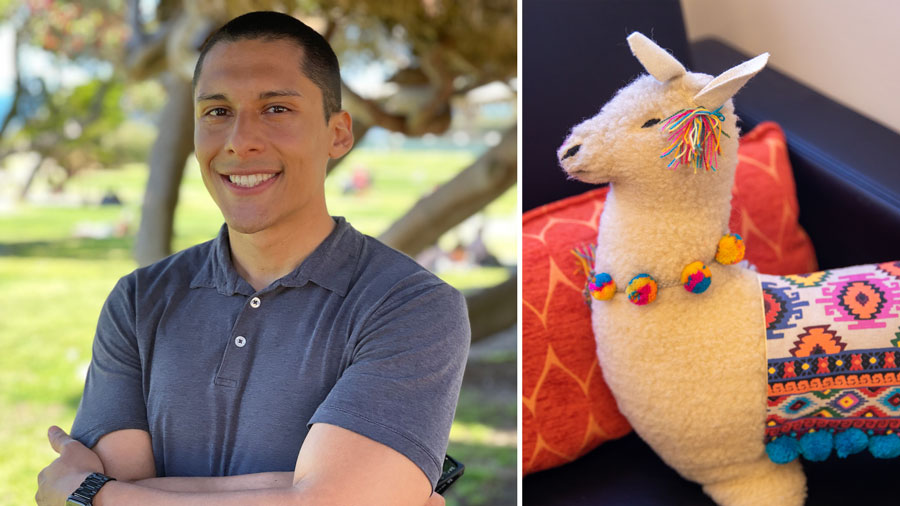
Benuto’s lab, also known as the DICE Center (Research Center for the Dissemination and Implementation of Culturally Sensitive, Evidence-Based Psychological Services) is bright with teal walls, hanging artwork and the Center’s mascot, Labita the llama, perched on a couch by the window. It is a space full of energy, and as Alan Garcia enters his second year in the clinical psychology graduate program under Benuto’s mentorship, the space is filled with boxes of toys. Garcia will be using these toys in his research on parenting interventions within Latinx families. The types of toys he will be using are distinct in that some are typical Anglo-American toys—Transformer dolls, LEGOS, superheroes—while others are traditional handcrafted and artisan toys more common in Mexico and other Latin American countries. He will be testing if by using more culturally familiar toys the treatment will be better received by the parents. Garcia is also performing a systematic review of evidence-based behavioral interventions to determine if Latinx populations, as well as other ethnic minorities, are adequately represented in the randomized trials.
Like many in his cohort, Garcia sought out Benuto’s lab in hopes of working with the Latinx population. He was also one of Benuto’s graduate students surprised to learn he would have the opportunity to conduct research and therapy in Spanish while he was a student. Garcia’s family moved from Mexico to the Los Angeles area when he was five years old. His mother had received her degree in psychology in Mexico and had been working in the field before moving to the U.S. where the language barrier kept her from continuing that work. Inspired by his mother, Garcia always knew he wanted to be a psychologist. He also recognizes the value of being a bilingual psychologist.
“When my parents would go to a supermarket or somewhere public like that, if they found someone who spoke Spanish, I could feel them immediately relax,” Garcia said. “When I first started working with Spanish speaking families as an undergraduate researcher at UCLA, I felt the same thing. They would see me as someone they could trust, someone they could talk to. I could see them relax. Being able to offer them help made me feel like I was giving back to my community. I didn’t really get a chance to grow up in Mexico, to experience that culture. I’ve always thought about psychology as a way to give back to my community, to stay closer to my roots.”
Francisco Reinosa Segovia
“I’m impressed with how resilient they are, how they continue to be resilient.”
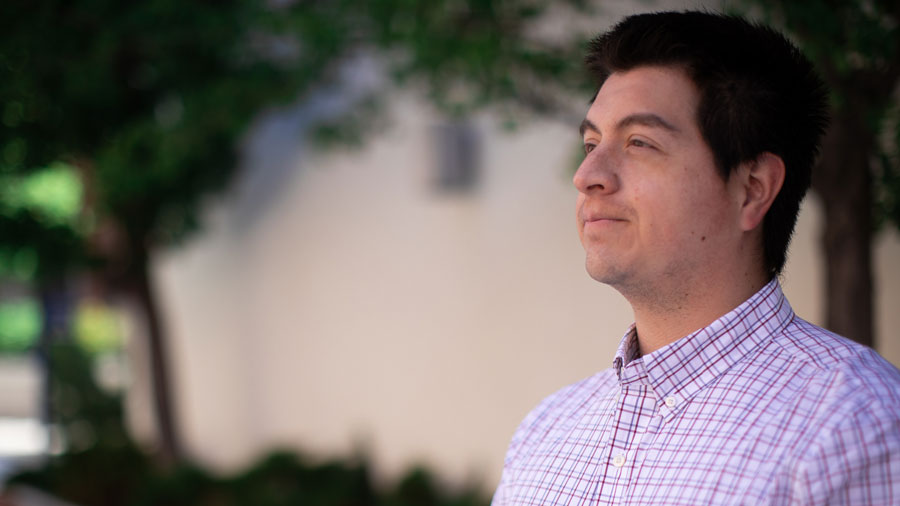
At 18 years old, Francisco Reinosa Segovia joined the Mexican military due to his limited opportunities to pursue a higher education. During this experience, he witnessed the impact of extreme poverty and the associated struggle to secure basic human needs such as food, water, housing and medical care that many families experienced. Frequently, he witnessed the consequences of this poverty for children as young as 12, who were forced to drop out of school to earn a living by cleaning car windshields, selling candies, and performing stunts on the streets. After two years of service, he decided to leave the military in order to follow his passion to improve the health and wellness of low-resourced communities. He left Mexico for the U.S. and enrolled in community college where he took English as a Second Language (ESL) classes along with introductory psychology classes. He worked several jobs from custodian to security guard to pay for his classes. Reinosa Segovia was dedicated, and soon he was in UCLA’s undergraduate psychology program conducting research under his former advisor, Professor Denise Chavira, whose research focused on recruiting promotoras (or community health workers) to be trained in delivering therapy services. With a referral from Chavira, Reinosa Segovia learned of Benuto’s lab and applied. He, like the others in his cohort, was excited by Benuto’s offer.
“Dr. Benuto offered me this unique opportunity of doing supervision in Spanish,” Reinosa Segovia said. “None of the other programs that I interviewed for offered that opportunity, of doing clinical work with Spanish speakers and having Spanish supervision.”
While delivering services in Spanish, Reinosa Segovia has witnessed a unique characteristic among many of his clients.
"None of the other programs that I interviewed for offered that opportunity, of doing clinical work with Spanish speakers and having Spanish supervision."
“The stressors that Latino populations encounter are very unique,” Reinosa Segovia said. “Their immigration status is pending. They have children over in Mexico or other countries. They have debts. They cannot drive or get a driver’s license. But they don’t worry so much about their mental health. They think, ‘I came here to work. I’m doing fine.’ I’m impressed with how resilient they are, how they continue to be resilient.”
Reinosa Segovia has witnessed that same resilience among Spanish-speaking clinicians in a research study conducted at the DICE Center. Using a focus group to collect data, Spanish-speaking therapists, social workers, clinicians and other service providers all reported that delivering services in Spanish was incredibly challenging and that it added significantly to their workload. However, all but one reported that they wanted to continue the work.
“I asked them, 'Why is that?'” Reinosa Segovia said. “They answered that they felt privileged to provide the community with someone to talk to, privileged to serve these underserved populations. That was very touching and inspiring.”
There is no doubt Reinosa Segovia would respond with the same answer if asked.
Cyndy Soto
“I was always very aware of my role as somebody who was stable and who would be relied on if things were to change.”
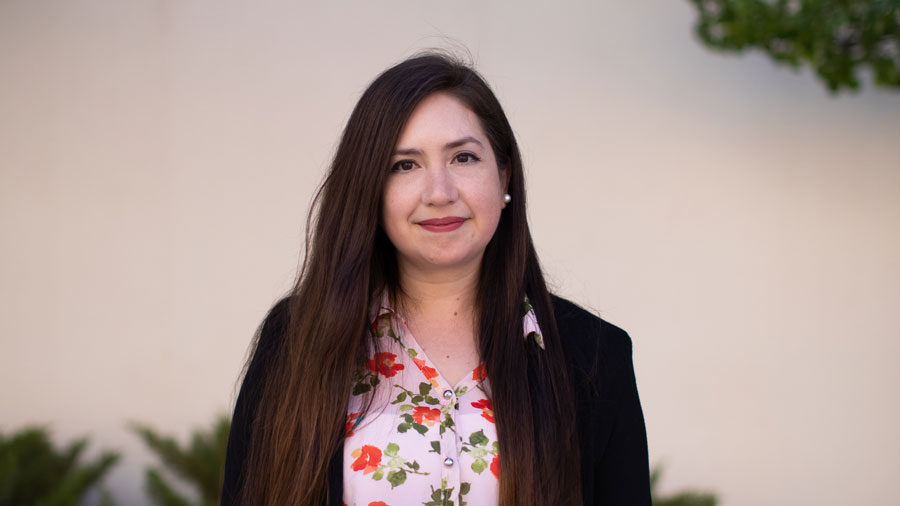
While speaking, postdoctoral fellow Cyndy Soto chooses her words thoughtfully, discerningly. She is unperturbed by quiet pauses in conversation. Her presence is calm and steady. This unique quality lends itself well to her profession. She is an exceptional clinician, in the words of Benuto. But these advantageous traits were not learned in graduate school. In fact, they are what almost kept her from pursuing college at all. Soto grew up in Surprise, Arizona, a rural suburb of Phoenix in an immigrant family of mixed status.
“I was always very aware of my role as somebody who was stable and who would be relied on if things were to change,” Soto said. “I think because of the mixed status, and some members not feeling very stable, going to college was actually very difficult. I didn’t want to leave my family, and I almost made the choice not to go.”
"One of the effects of systemic racism is this imposter syndrome that comes from not having representation, not seeing other Latino professors or researchers, and feeling like we don’t belong. One of the things I’m hoping to work on is increasing that sense of belongingness for Latino students."
Fortunately, Soto did attend college and subsequently graduate school at the University to work in the field of geropsychology, a sub-discipline focused on the mental health and well-being of older adults, with Benuto’s colleague, Professor Jane Fisher. Soto received her Ph.D. in the spring of 2021 with Fisher and Benuto co-chairing her dissertation. In June, she started as a postdoctoral fellow in Benuto’s lab where she plans to continue her research on the impact of culturally tailoring services and improving access to Spanish-language treatment and materials for the Latinx population. She will also be joining Benuto in recruiting students like herself to the program.
“As a postdoc, I’m hoping to also help with the recruitment of Latino students into the field,” Soto said. “We’ve found in our discussions and in talking to other students, even in other fields, that one of the effects of systemic racism is this imposter syndrome that comes from not having representation, not seeing other Latino professors or researchers, and feeling like we don’t belong. One of the things I’m hoping to work on is increasing that sense of belongingness for Latino students.”
Benuto and Soto plan to develop a video campaign highlighting Latinx professionals and students working in the field of clinical psychology and sharing their stories.
“It’s still very much in the idea phase and it evolved out of our lab conversations about systemic racism, imposter syndrome, the importance of representation in the field/academia and the impact of hearing other Latinx stories,” Soto said. “We’re going to be developing a video series sharing the stories of Latinx professionals and students with the aim of targeting systemic racism by promoting belongingness for BIPOC students.”
Whether serving as a role model for students, mentoring young clinicians or acting as a trustworthy confidant for her clients, Soto will continue to serve as someone her academic, clinical and Latinx community can rely on—a role she has embraced since a child.
“I’m really passionate about continuing to provide Spanish services, continuing the work we’re doing with providing culturally-sensitive evidence-based treatment to this population,” Soto said. “I grew up always knowing that it was one of my values to help other people, that community was really important for support and for survival. I believe it was my freshman year of high school, I took a psychology course and I just became fascinated with clinical psychology and something clicked in my brain. I realized this is how I can help people.”
